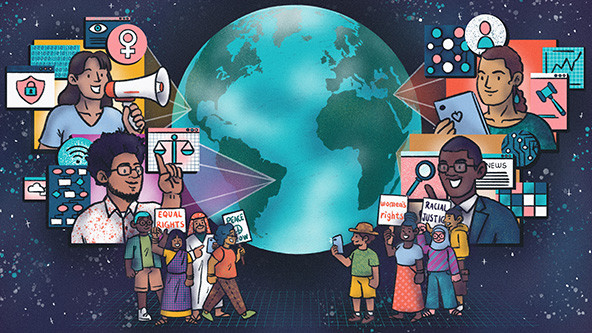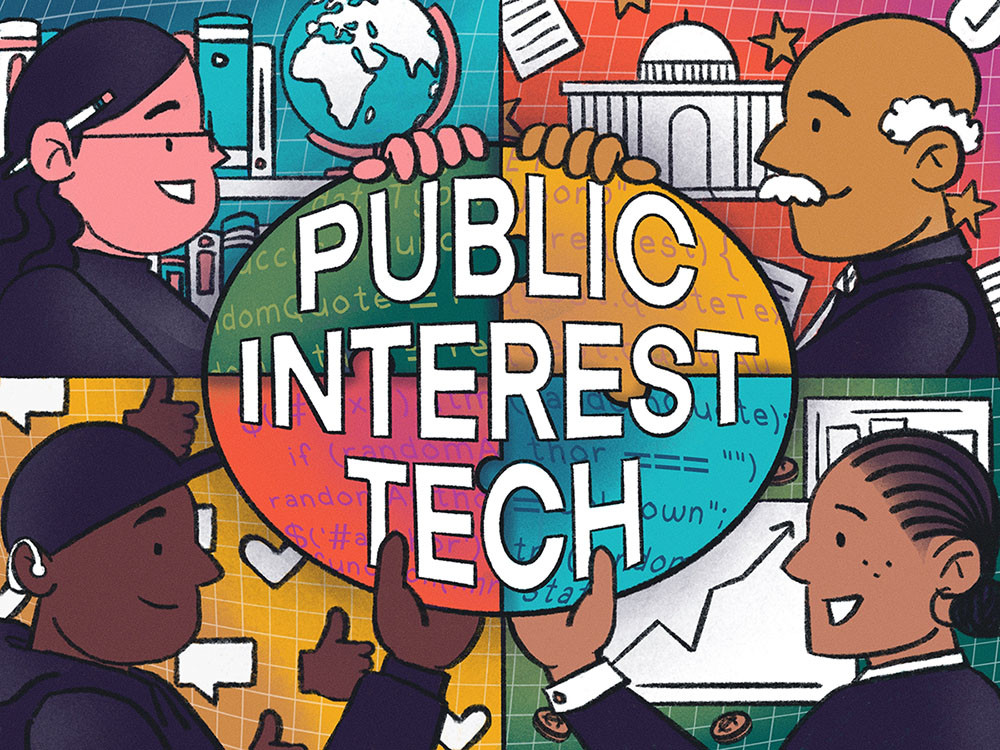 (Illustration by Vreni Stollberger)
(Illustration by Vreni Stollberger)
In an increasingly connected world, human rights are inseparably intertwined with technology. Individuals and organizations working for social justice must mitigate technology’s grave harms, but also harness technology to strengthen their work.
It’s a thorny paradox. For example, human rights workers face surveillance, harassment, censorship, and disinformation that undermines their work and threatens their lives. Governments and corporations abuse digital technology to surveil human rights defenders in Mexico, political dissidents in Argentina, and environmental activists in Brazil. And disinformation campaigns waged across digital platforms have undermined democratic processes in Colombia, Kenya, and the United States.

Yet technology can also be a powerful shield and tool for human rights workers. For example, Brazil’s Internet Lab in 2018 helped advance protections that criminalize the non-consensual recording and distribution of intimate images, a form of online violence that disproportionately harms women. Technology played a vital role in this victory, from online organizing to an online tool that helps victims understand the resources and remedies available to them.
Amid this paradox, many civil society organizations protecting human rights de-prioritize technology in their work. This is largely due to a dearth of capacity: These organizations can lack technical access, funding, or skills. This lack of capacity is especially dire in the Global South, where technology is actively being used to curtail civic engagement, infringe on human rights, and cloud public opinion. Thus essential civil society organizations can’t protect themselves, scale their efforts, or strategically harness technology.
The reality is, civil society organizations and human rights defenders cannot carry out their missions without technological expertise. They need interdisciplinary public interest technologists who understand both human rights and the complex regional dynamics they are operating within. Yet the pipeline for such experts has been lacking.
Fortunately, funders have an opportunity to address this gap.
Over the past 20 months, the Ford and Mozilla Foundations have partnered on the Tech + Society fellowship to embed interdisciplinary public interest technologists into key civil society and human rights “host” organizations across the Global South. These fellows bring hard tech skills. They help civil society and social justice organizations incorporate technological perspectives in their work. And they also surface vital questions, like: How can technology increase the effectiveness of our work? What are the unintended consequences of these technologies? Who does and does not have access to these technologies? And How might technology be weaponized against me and others? (Many of these questions are also discussed in this SSIR series.)
Now, just under two years in, this program has significantly bolstered the host organizations’ abilities to carry out their missions and protect themselves from digital violence. To facilitate sharing our learnings across this growing field, this article highlights case studies, and also provides lessons learned for like-minded funders.
Protecting Marginalized Communities From Digital Violence
Alex Argüelles, a Tech & Society fellow based in Mexico, says one of their biggest challenges is getting people to understand the various ways technologies are used as a tool of violence by the state—and then motivating people to hold the state accountable.
“There is little to no information available on which technologies are being used, by whom, for how long, and how,” Alex explains. “The government has the power and capacity to surveil and squash dissent, while activists, journalists, and human rights defenders are still trying to figure out how to protect their safety amidst the lack of justice.”
Tech & Society fellow Tarcizio Silva also struggled to motivate others in Brazil to prioritize digital rights and security. “There is a lack of resources to fight digital violence,” he says. “Only a very small fraction of people look to digital rights as something that is very important,” despite the fact that digital technologies are exacerbating some of the most pressing issues of inequality in the country.
Indeed, Brazilian leaders are embracing predictive technologies and AI even as these technologies reinforce institutionalized racism. Take for example Brazilian law enforcement’s use of facial recognition software and crime prediction platforms that consistently register higher error rates for Black people, leading to the unfair profiling and mass incarceration of Black Brazilians.
Silva’s fellowship is hosted by Ação Educativa, an organization dedicated to promoting democracy, social justice, and socio-environmental sustainability. Silva spends his fellowship raising awareness around digital rights and harmful AI. He created workshops for educators and young people to learn about data protection laws and develop strategies to protect themselves online. Silva also strengthened Ação Educativa’s knowledge about cybersecurity by auditing strengths and weaknesses at the organization, using Ford Foundation’s Cybersecurity Assessment tool.
Protecting Civic Engagement From Disinformation
In Kenya, fellows Brian Obilo and Odanga Madung uncovered mass disinformation campaigns on Twitter targeting journalists, judges, and other members of civil society, intended to sway public opinion during elections and protests.
In 2021, Kenya’s outgoing president was implicated in a massive investigation revealing how he, among several other public figures, used offshore tax havens to hide assets worth billions of dollars. While the news was immediately met with outrage, coordinated disinformation campaigns flooded social media to discredit the report and distort public opinion to protect the president. Madung and Obilo discovered that the disinformation campaigns were being waged by paid influencers, and that Twitter took very little action to curb the campaigns. In fact, just the opposite happened: Twitter’s trending algorithm amplified the campaigns.
Through his fellowship, Obilo works with the Katiba Institute, an organization dedicated to promoting awareness of Kenya’s Constitution, where he builds cybersecurity capacity and awareness among staff. Madung works with Partnerships 4 Empowerment and Networking (PEN), an organization dedicated to supporting civic engagement in Kenya.
Obilo says most civil society organizations in Kenya and other countries in the Global South are not equipped to deal with issues like cybersecurity, disinformation, or platform regulation on their own, and that they don’t have the resources to recruit experts to help defend themselves. “More NGOs and civil society organizations need to participate in the conversations around regulations so they can bring the human rights lens,” he says.
Ultimately, the research Obilo and Madung conducted during their fellowships led Twitter to take action on hundreds of accounts that violated its platform policies, and also supported their host organizations’ missions by protecting civic engagement in the country.
Meanwhile, in Lebanon, the population faces several emergencies, from the spread of COVID-19 to a financial crisis and rise in unemployment, to more than three-quarters of people living below the poverty line. Public institutions, the judiciary, and NGOs alike have been operating under extremely limited capacity. Access to accurate information is a crucial ingredient for solving these intersecting crises. However, access to such information in Lebanon has historically been exclusive and politicized.
Fellow Jessica Chemali is building data systems to ensure human rights defenders—like activists, students, researchers, and journalists—have access to the information they need to foster civic engagement. Chemali’s fellowship is hosted by Legal Agenda, an organization dedicated to providing reliable and accurate information free from the influence of governments and corporations. It provides research, investigative journalism, and judicial watchdog services to support civic engagement in the Middle East.
Through her fellowship, Chemali established a parliament observatory website to ensure voters, media, and activists had access to comprehensive and accurate information about parliamentary leaders and their actions. This database was also featured in the Lebanese media.
Protecting Women and Non-Binary Human Rights Defenders From Online Abuse
Online violence, including harassment, threats, doxing, hacking, and defamation, is an issue that overwhelmingly impacts women. A 2020 global study by The Economist Intelligence Unit found that 85 percent of women report witnessing violence against other women online, and more than 1 in 3 women have personal experience with online violence. Further, 9 in 10 women report that online violence harms their well-being, and nearly 3 in 4 express concern that online violence will escalate offline.
This phenomenon is integral to the work of Tech & Society fellow Amarela, who works with human rights organizations Federação de Órgãos para Assistência Social e Educacional (FASE). As part of her fellowship, Amarela is organizing a learning process for social activists and organizations focused on women’s rights, land rights, and human rights to better understand data and avoid surveillance by governments and adversaries.
“Women are increasingly working in this space because we are the ones who are often violated,” Amarela says. “There is a parallel between the feminist phrase ‘my body, my rights’ and ‘my data, my rights’ that is worth acknowledging. The offline and online worlds are not separate. When you are attacked online, you are attacked in real life.”
Amarela also notes that in her work, she often encounters a damaging misconception that women cannot handle data or understand technology. To combat this, Amarela creates trainings and workshops for women to ask questions and gain the knowledge needed to securely navigate online spaces.
The women’s movement in Mexico has faced continued government repression on issues like reproductive rights and sexual health. Both women and gender non-conforming people who are part of the LGBTQ+ communities in Mexico continue to face heightened violence. Often these activists, and their family members, must become experts in responding to state-sponsored violence.
And so fellow Alex Argüelles, mentioned earlier, leveraged their technical expertise to build a free digital resilience laboratory called comun.al to support these individuals. One example of the many tools and resources that comun.al provided in its first year is Digital Violence in Mexico: The State Vs. Civil Society, an anthology that offers collective memories, reflections, and advice from digital rights defenders.
Lessons for Funders
The above case studies illustrate how vital it is for civil society and public interest technologists to work in tandem. For our funder-colleagues supporting similar work, we want to share the following five lessons from this fellowship, which may serve as a model:
- Interdisciplinary expertise is crucial. Building digitally resilient civil society organizations includes—but goes beyond—digital security. Interdisciplinary technologists with cultural and socio-political expertise are also crucial.
- Regional context matters. Historically, much of the funding to support digital resilience for human rights defenders has been concentrated in the Global North and West. Civil society and social justice organizations need interdisciplinary public interest technologists who understand the regional context and the nuances of threats to civic engagement in different localities.
- Organizations must fully understand how digital technologies are used as a form of violence. Many fellows reported that human rights defenders in their communities sometimes lacked an understanding of which technologies were being used against them, how and by whom. Building a full understanding will empower human rights defenders to prioritize digital resilience, to protect themselves, and to hold actors accountable.
- Intersectional feminist approaches are vital. Intersectional feminist approaches to public interest technology are equally crucial when it comes to helping civil society organizations leverage technology. This perspective allows them to strengthen and scale their work and to address the specific, gendered threats that women and non-binary human rights defenders face.
- Networks strengthen civil society across the board. “Many countries in the Global South have shared experiences when it comes to the most pressing digital and human rights issues they’re facing,” explains Tarcizio Silva. “Creating spaces like this fellowship allows tech experts and human rights defenders across the globe to connect, share, and learn from one another.”
Support SSIR’s coverage of cross-sector solutions to global challenges.
Help us further the reach of innovative ideas. Donate today.
Read more stories by Alberto Cerda Silva, Amy Schapiro Raikar & Roselyn Odoyo.

